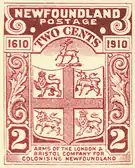London and Bristol Company
The London and Bristol Company came about in the early 17th century when English merchants had begun to express an interest in the Newfoundland fishery. Financed by a syndicate of investors John Guy, himself a Bristol merchant,[1] visited Newfoundland in 1608 to locate a favourable site for a colony.[2] Upon his return to England 40 people applied for incorporation as the Tresurer and the Companye of Adventurers and planter of the Cittye of london and Bristoll for the Collonye or plantacon in Newfoundland.[3] The company was known as the London and Bristol Company or simply the Newfoundland Company.
 Newfoundland postage stamp featuring the arms of the London and Bristol Company | |
| Type | Public |
|---|---|
| Industry | International trade |
| Fate | Dissolved |
| Founded | 2 May 1610 |
| Founders | John Guy |
| Headquarters | , England |
Area served | Newfoundland |
Key people | Henry Cary, 1st Viscount Falkland |
The company was granted a charter by James I on May 2, 1610 giving it a monopoly in agriculture, mining, fishing and hunting on the Avalon Peninsula.[4] They retained exclusive rights until 1616 when the Crown began to grant lands to others.[5] The new grants were then initiated by the Bristol Society of Merchant Ventures.[6] The Merchant Ventures were made up of many who had been members of the London and Bristol Company.
Among some of the other prominent members of the London and Bristol Company, Henry Cary, 1st Viscount Falkland became a supporter of the venture. Cary had influence in the company through his wife, daughter of Sir Laurence Tanfield, one of the leaders of the Company.[7]
See also
References
- Ross, Andrew; Smith, Andrew (2011). Canada's Entrepreneurs: From The Fur Trade to the 1929 Stock Market Crash: Portraits from the Dictionary of Canadian Biography. University of Toronto Press. ISBN 9781442662544.
- "The Cupids Colony and John Guy". Heritage Newfoundland and Labrador. Retrieved 2 November 2015.
- ""Charter of the London and Bristol Company. Earl of Northhampton and Associates." Volume III 1701-1705: The Labrador Boundary Dispute Documents". Heritage.nf.ca. Archived from the original on 2013-10-21. Retrieved 2015-03-10.
- Naylor, R. T. (2006). Canada in the European Age, 1453-1919. McGill-Queen's Press. p. 56. ISBN 9780773575462.
- Chambers, Anne Lorene (1997). Married Women and Property Law in Victorian Ontario. University of Toronto Press. p. 34. ISBN 9780802078391.
- Clarke, Sandra (2010). Newfoundland and Labrador English. Edinburgh University Press. p. 5. ISBN 9780748631414.
- "Tanfield, Francis". Heritage Newfoundland and Labrador. Retrieved 2 November 2015.